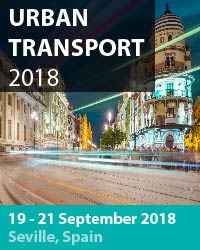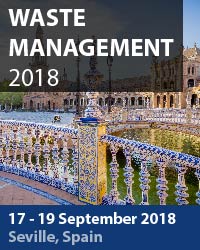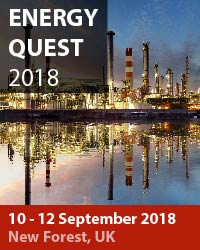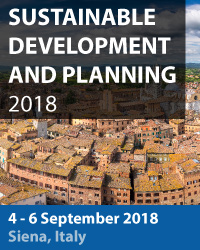41st International Conference on Boundary Elements and other Mesh Reduction Methods

11 - 13 September 2018
New Forest, UK
Overview
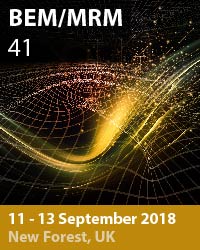
The annual conference on Boundary Elements and other Mesh Reduction
Methods (BEM/MRM) which started in 1978, reached its 41st version this
year. The 2018 conference took place in the New Forest, near Southampton
(UK). The Conference was organised by the Wessex Institute, UK,
represented by Dr Stavros Syngellakis, and the University of
Mississippi, USA, represented by Professor Alex Cheng.
Since its beginning in 1978, the Conference has attracted high
quality papers reporting further advances in techniques that reduce or
eliminate the type of meshes associated with finite elements or finite
differences, for instance. The meeting acts as a forum for discussion of
new formulations and for critical comparison of results before
solutions and numerical tools are released to end users.
Opening of the Conference
The very first session of the conference was dedicated to the memory of the founder of Wessex Institute,
Professor Carlos A Brebbia.
For this tribute to Carlos, BEM/MRM delegates were joined by those
attending the Energy Quest conference as well as other colleagues and
friends from Ashurst Lodge and Elsevier.
This session was opened by Professor Alex Cheng from the University
of Mississippi who welcomed everyone to this special occasion then
referred briefly to Carlos's personality as a friend and colleague. Then
Dr Stavros Syngellakis spoke about the establishment and development of
the Wessex Institute as Carlos's unique achievement, described recent
research projects and the Institute's knowledge transfer activities
carried out under his leadership. Ms Juliet Jones from the Wessex
Institute gave a chronology of key events in Carlos's personal and
professional life. This was followed by a presentation focusing on
Carlos' contribution to the boundary element method by Professor Alex
Cheng. Alex explained how inspiration from earlier work on boundary
integral equations led Carlos to the establishment of the method not
only as a mainstream academic pursuit but also as a valuable tool for
solving practical engineering problems. The session ended with short
contributions by several delegates from both conferences who knew Carlos
well and made moving references to their personal and professional
association with him.
Presentation of the George Green Medal
The second morning session was dedicated to the George Green Medal
award. Professor Cheng gave a brief account of George Green's life and
work, then explained the rationale behind the establishment of the award
by the Wessex Institute and the University of Mississippi. The 2018
award was presented by representatives of Elsevier Publishers who
sponsor it. The recipient was Professor Ney Dumont, of the Pontifical
Catholic University of Rio de Janeiro.
Subsequently, Professor Dumont gave the George Green Medal lecture entitled:
“Conceptual review of variationally-based hybrid boundary element methods”.
Invited Presentations
There were a series of invited presentations by well-known colleagues:
- “Multi-domain boundary element method for axisymmetric problems in
potential theory and linear isotropic elasticity”, by Elena Strelnikova,
Ukrainian Academy of Sciences, Ukraine.
- “Moving finite element method”, by Vladimir Sladek, Slovak Academy of Sciences, Slovakia.
- “Determination of shape parameter in RBF approximation”, by Andreas Karageorghis, University of Cyprus, Cyprus.
- “RBF-based laser speckle pattern digital image correlation method
for surface strain measurements”, by Eduardo Divo, Embry-Riddle
Aeronautical University, United States.
- “Green’s functions for a two-phase soft electroactive space under a bias”, by Weiqiu Chen, Zhejiang University, China.
- “BEM analysis of plane wave coupling to three-phase power line”, by Dragan Poljak, University of Split, Croatia.
- “An RBF interpolation blending scheme for effective shock-capturing
with conjugate heat transfer”, by Alain Kassab, University of Central
Florida, United States.
- “Cauchy BVP for elastic half-plane posed in displacement
orientations,” by Alexander Galybin, Schmidt Institute of Physics of the
Earth-IPE RAS, Russia.
- “Multiple fatigue crack growth modelling in nonhomogeneous
structural systems using the dual BEM”, by Edson Leonel, University of
Sao Paulo, Brazil.
Conference Topics
The papers presented during the Conference were classified under the following session headings:
- Fundamental solutions and Green’s functions for complex problems
- Advanced BEM formulations
- Advances in mesh reduction methods
- Computational techniques
- Fracture Mechanics applications
- Other modelling approaches
There were several occasions for holding informal discussions during
the coffee breaks and the complimentary lunches that the hotel prepared
for the delegates.
Conference Publications
Papers presented at this conference will appear in Vol. 122 of the
WIT Transactions on Engineering Sciences
(ISSN: 1743-3533, ISBN 978-1-78466-295-0). All papers presented at the
meeting since the 1994 conference are available Open Access in the
eLibrary of the Wessex Institute (
https://www.witpress.com/elibrary), from where they can be freely downloaded by any interested parties.
A few papers have been selected for publication in the
International Journal of Computational Methods and Experimental Measurements.
This Journal provides the scientific community with a forum to present
the interaction between the complementary aspects of computational
methods and experimental measurements, and to stress the importance of
their harmonious development and integration.
EABE Editorial Board Meeting
At the end of the first day of the Conference, members of the
Editorial Board of the International Journal of Engineering Analysis
with Boundary Elements (EABE) met to discuss how the publication is
progressing and ways in which its performance versus other journals on
Computational Methods in Engineering can be improved. The meeting was
also attended by two Elsevier representatives, Ms Carrie Christensen
from New York, the journal manager, and Mr Christopher Greenwell from
Oxford, UK. Carrie gave a presentation of the state-of-the-journal. Most
notable in the report was significant rise of the impact factor, which
is now 2.14, and the high first quarter journal ranking in all 4
categories that EABE is listed.
This was followed by a lively discussion of the board. A number of
good suggestions were received. One very important decision was taken
based on the Board’s recommendation, namely that EABE starts to present a
Best Paper Award annually.
The meeting closed with a sumptuous dinner in a private room of the
Balmer Lawn Hotel, the conference venue. At the end of this, Professor
Alex Cheng, the journal’s editor-in-chief, thanked everyone for their
support of the journal.
ISAC Meeting
The ISAC members who attended the conference had an informal meeting
over lunch to discuss the various issues that contribute to the
continuing success of the series, namely, conference themes, ISAC
membership and future venues. During the lively discussion that ensued,
many suggestions and recommendations were received, which were recorded
and will be assessed by the conference organising committee. At the end
of the meeting, Dr Stavros Syngellakis thanked the members on behalf of
WIT for their support in ensuring the high quality of delegates’
contributions.
Conference Dinner
The conference dinner took place on Wednesday evening in the Beech
Room, one of the private function rooms of Carey's Manor Hotel,
Brockenhurst, which is within walking distance of the conference venue.
Carey's Manor enjoys a high reputation as a hotel and for its
restaurants. The table was stylishly laid and candles and gentle music
created a relaxed atmosphere, with wonderful service from our dedicated
waiter and team. A group photograph was taken outside in the beautiful
grounds, to mark the occasion.
The three course menu, accompanied by red and white wines from the
Valle Central area of Chile, consisted of predominantly locally sourced
ingredients which in many cases are organic and free range. All present
found this to be a rich and satisfying meal and many took tea or coffee
afterwards.
Professor Giorgio Passerini, representing WIT at the conference
dinner, thanked both the delegates and the chairs of the two
conferences, Professors Cheng and Magaril, for the success of both
conferences and reflected on the dinner. He also said that he looked
forward to the next in the series, for BEM in Coimbra next year and in
2020 for Energy Quest, at a venue to be arranged within the next 12
months.
Professor Alex Cheng added some comments about how Carlos was the
driving force before for BEM and now the method and the conference
relied on WIT members and conference participants to push it forward.
Closing of the Conference
The conference was closed by Alex and Stavros, who thanked the
delegates for attending and hoped that they would consider attending
BEM/MRM42 when the meeting is reconvened in Coimbra, Portugal from 2-4
July 2019.
Related Conferences
Multiphase Flow 2019, 21 - 23 May 2019
Materials Characterisation 2019, 22 - 24 May 2019
CMEM 2019, 3 - 5 June 2019
ERES 2019, 5 - 7 June 2019
BEM/MRM 42, 2 - 4 July 2019
